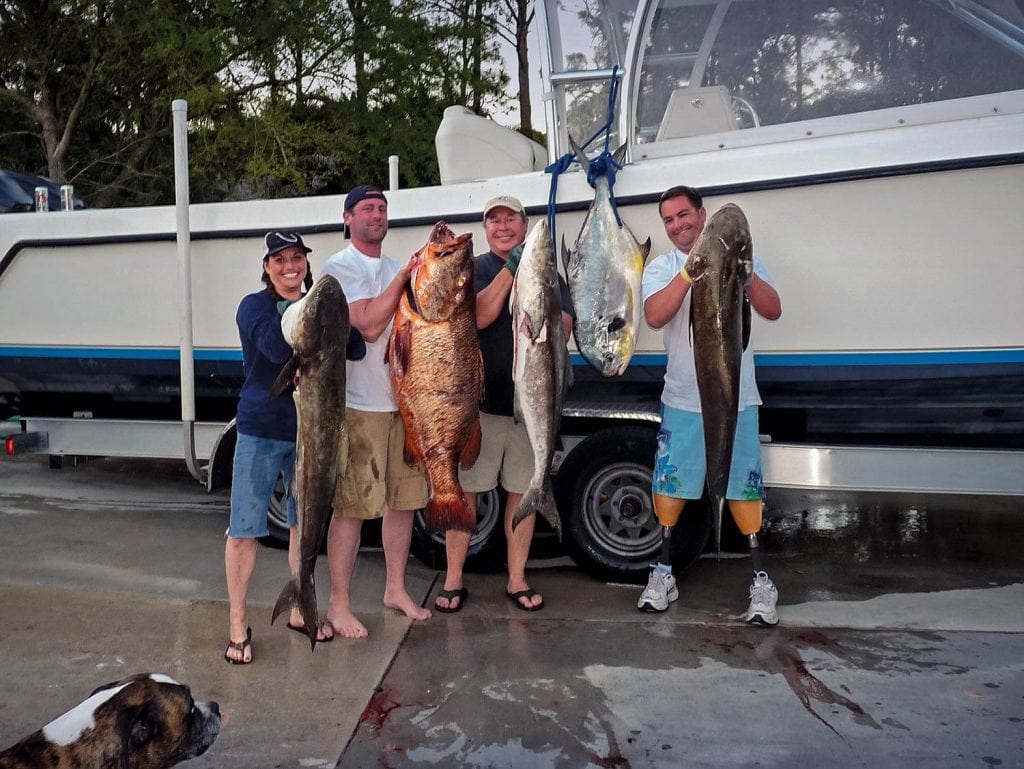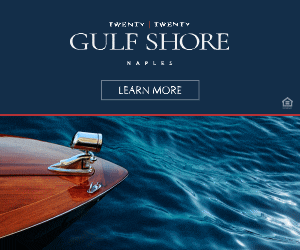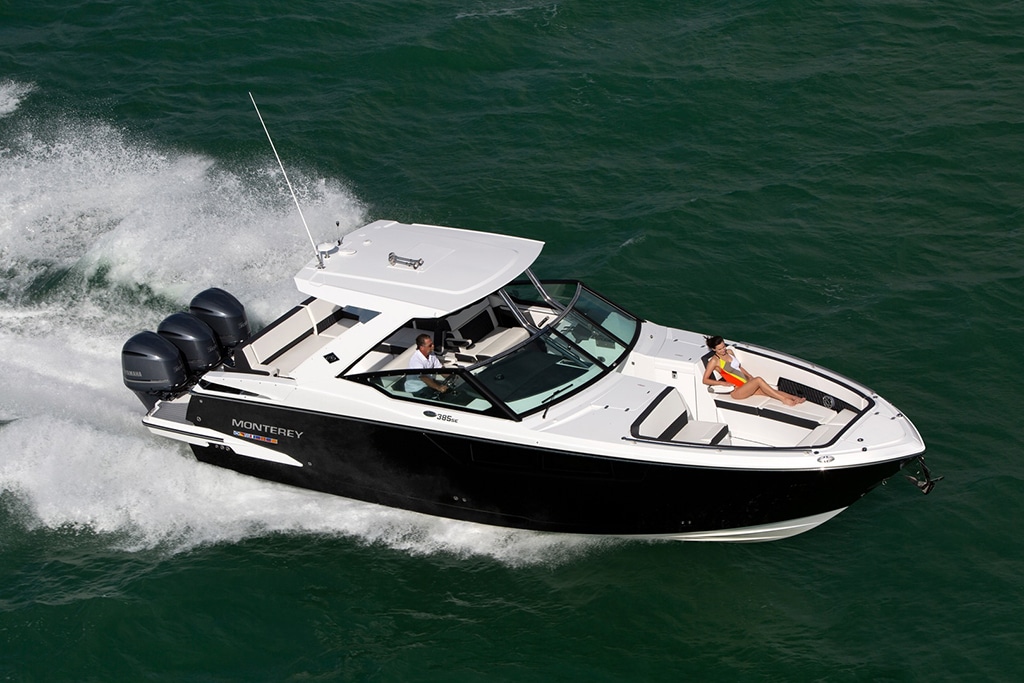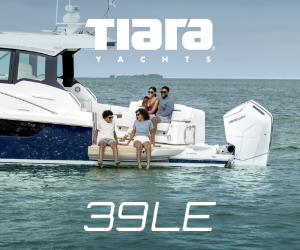Individuals with disabilities stay active on the water through products, boat designs and organizations.
Individuals with disabilities make up the nation’s largest minority group, which is also the only minority group that one can become a part of at any time in their life. In the last two years more than 20 million families in the U.S. have reported at least one family member with a disability, and nearly 40 percent of disabled individuals live in the South. When someone close to you is affected, that statistic becomes very personal and passion to spread awareness ignites. Thankfully, there are many companies, organizations and individuals in the marine industry that strive to enhance on-the-water accessibility for people with varying degrees of physical disability.
Twenty-seven-year-old Rob Murphy—an avid spearfisherman, diver, snowboarder, angler, and wakeboarder based in Palm Beach County, Florida—was spearfishing on a routine dive with five friends, just as he had done dozens of times before, when his life drastically changed. While surfacing, Rob was run over by a 36-foot sportfishing boat that negligently sped towards him despite his proper dive flags and warning yells. The propellers struck his oxygen tank—which saved his life—but his legs were severed just below the knees. Just two months after his accident, the diving and boating community celebrated Rob’s return to the water with custom prosthetic swim legs made by Matthew Bailey of Palm Beach Prosthetic Services, part of Florida O&P Services.
“Since Rob not only wanted to be out on the water on a boat but actively in the water, we had to make sure his dive prosthetics were completely saltwater-resistant, so we removed all the metal we could,” explains Bailey. Rob’s dive legs are exoskeletal, which means all the strength is in the outer shell. They are hollow with holes in the shell to allow water to flow through freely while swimming and ensure they aren’t buoyant. They also allow drainage once back in the boat. “His dive prosthetics are shaped just like regular legs, so they have the same hydrodynamics and allow him to swim normally,” Bailey says. “We ordered special dive ankles and beachcomber feet to allow Rob’s ankles to lock in a 70-degree swimming position or 90-degree walking position, so he can walk in the boat without changing his legs.” Bailey located a fly-fishing shirt company that had an “underwater camouflage” water pattern that he laminated onto the legs with clear resin per Rob’s design request.
[photomosaic ids=”6157,6158,6159,6160,6161,6162,6163,6164,6165″ orderby=”rand”]
Rob not only survived against the odds in a sudden tragic accident, but today—almost six years later—he is thriving both in and out of the water. When not hunting big fish for both recreation and spearfishing tournaments onboard his 31-foot Contender that he custom-designed for spearfishing, you can find him advocating for increased diver safety and building his growing business. “I will always love scuba diving, but I love how natural and pure freediving is—the freedom of diving down on a single breath of air is unlike anything else,” Murphy says. As an active young professional, he continues to inspire both disabled and able-bodied individuals to pursue their passions despite any obstacles. palmbeachprosthetics.com
Dr. Stanley Seidman, a successful psychologist in Fort Lauderdale, had an accident at six years old and when a doctor made a mistake, Stanley’s left arm required amputatation. Despite his physical setback Dr. Seidman began boating in 1974 and he and his wife Carol have cruised on their 63-foot Neptunus Pan-a-sea-a since 2001. When Carol cannot join her husband on the water, however, docking the large vessel single-handedly is a challenge. Around three years ago Dr. Seidman began using Yacht Controller, a battery-operated wireless device that allows him to remotely control his bow thrusters, stern thrusters, anchor, and engines in and out of gear at the press of a button. It sends a unique coded signal between the transmitter and receiver on Pan-a-sea-a to control docking functions anywhere on board. “When I used to dock the boat by myself it was a challenge, but Yacht Controller makes it much easier,” says Dr. Seidman.
The remote has a simplistic design with easy-to-use controls and requires very little adjustment time to become proficient. “I also love my Yacht Controller when we have to stop at bridge openings. I use the remote to effortlessly keep us in the same position,” Dr. Seidman says, who explains how the installation process is very simple for all standard powerboats. yachtcontroller.com
Captain Mick Nealey is an experienced Keys captain and guide who launched Active Disabled Americans and Tranquil Adventures over 20 years ago to keep people with disabilities active and engaged in the water through fishing, snorkeling, kayaking, sightseeing, and other eco adventures in Key Largo. Captain Mick suffered from polio as a two-year-old and sometimes still uses a wheelchair to board his 28-foot pontoon boat via a ramp, which he also uses for guests. “I also modified a Jet Ski lift, called The Swinger that allows someone to simply sit in a chair that swings over the side of the boat and lowers into the water for easy access to swim, snorkel and kayak,” he says. “I’ve modified fishing equipment for people who cannot hold a rod and reel, scuba gear, and special kayaks for individuals with specific needs,” he states. Individuals can charter half-day or whole-day experiences that are catered specifically to their needs. activedisabledamericans.org
Two and half years ago husband-and-wife team Andrew and Karen Grego had the idea to build an attractive, versatile aluminum sportfishing boat. When someone mentioned outfitting it for wounded soldiers, Blue Water Warriors was founded with the purpose of helping veterans experience the ocean’s renewal through deep-sea fishing and diving adventures. Alongside marine engineers and innovative boat designers, Blue Water Warriors has developed and built the completely custom 37-foot Warrior—Hull #1 for the couple’s new line of Vision boats. “Our able-bodied brain would choose to do something one way based on what we know, but the guy who is physically injured might think differently,” says Andrew Grego. “I visited Walter Reed [Medical Center] several times to discuss what specifications on a boat would suit them and we have created a boat that someone in a wheelchair can basically board and run independently.”
When you see her, you recognize that Warrior is a vessel worthy of the brave men who will use her. “The guys we are dealing with are type-A personalities who don’t want to look or feel any more physically handicapped than they already are, so our main directive when designing Warrior was to create the feeling of empowerment and independence,” says Grego. Her features include wheelchair accessibility without a hoist, SeaKeeper gyrostabilizer for maximum stability, specially adapted fighting chairs, harnesses and equipment for fishing, transom and side doors that swing open, specially developed non-skid floor surfaces, on-deck wheelchair locks, storage for prosthetic limbs, and a deck-level head with an elevator lift to accommodate people with and without wheelchairs with no assistance.
One of the most inspiring details of this project is the overwhelming support from the local marine businesses. “The majority of this boat—electronics, labor to build, paint, motors, anchor, etc.—have been donated from local business and services who believe in this organization and its purpose,” Grego explains. “We are putting the logos of each donor on the boat and plan to attend as many boat shows as possible to introduce Warrior.” The couple dreams of growing their line of Vision boats by building one of these custom boats for each of the six polytrauma rehabilitation centers at military base hospitals down the East Coast and over to Texas’ Gulf Coast.
These individuals, products and organizations are just a handful of the many that positively impact the quality of life through boating for the disabled. Organizations and initiatives exist throughout the country that offer a multitude of on-the-water adventures. If you or someone in your life is challenged with a physical disability, research opportunities in your cruising area to ensure everyone can benefit from the refreshing, renewing experience that only the water can bring.
By Christine Carpenter, Southern Boating November 2014














